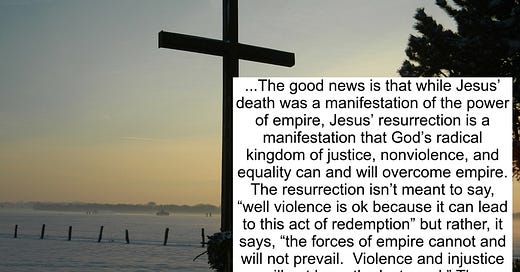Easter Sunday and the Theology of Empire
As they entered the tomb, they saw a young man, dressed in a white robe, sitting on the right side; and they were alarmed.
But he said to them, "Do not be alarmed; you are looking for Jesus of Nazareth, who was crucified. He has been raised; he is not here. Look, there is the place they laid him. Mark 16:5-6 (NRSV)
Today is Easter Sunday. Growing up, I grew up in a tradition that called it, “Resurrection Sunday,” in order to push back against the commercialization and secularization of Easter. In this tradition Resurrection Sunday was meant to celebrate the literal resurrection of Christ which signified God’s defeat over death and hell (for a select few).
Resurrection Sunday was the culmination of the “Good News” which in that tradition meant that if we believed certain things we could avoid spending an eternity in hell. People who accepted Jesus Christ as “their personal Lord and Savior” would be able to skip out on an eternity of damnation because Jesus suffered an incredibly painful and violent death and was resurrected three days later. (Everyone else of course, would be shit out of luck).
In fact, the tradition I grew up in, placed more emphasis on the violent death of Jesus than on the resurrection. Yes, yes, the resurrection was important and if a physical, bodily resurrection, didn’t historically occur then our whole faith was meaningless, but the central focus was still on Jesus’ violent death. The blood of Jesus is what saved. Jesus’ brutal beating and painful death was the price that needed to be paid in order for humanity to be “saved.” The resurrection seemed like almost an afterthought. It was sort of like, “well yes, Jesus died a horrifically painful, unjust death. But it’s ok because he came back to life after three days.” Without Jesus’ gruesome death, resurrection could not occur, and neither could God’s redemption of sinful humanity.
The problem with this understanding of Jesus’ death and resurrection, besides treating the resurrection as an afterthought, is the emphasis on violence as redemptive. In this interpretation of Jesus’ death and resurrection, violence is central to God’s plan for human redemption. The brutality of Jesus’ death was salvific. This theology does nothing to counter the theology of empire, instead it reinforces it. The theology of empire is undergirded by violence. The theology of empire says that salvation is tied to brutality and violence.
The Roman authorities who ordered Jesus to die, were an enacting a theology of empire. They were asserting that Jesus’ death was necessary in order to protect the empire. The theology of empire, continues to function and thrive today. Ironically, those who adhere to the idea that God sent Jesus to die a horrible death in order to save humanity, are furthering this theology of empire, instead of undercutting it. They are reinforcing the idea that state violence saves.
This theology of empire that emphasizes that violence can lead to redemption continues to lead to the needless deaths of innocent people. We see this theology in action every time a police officer murder someone. Most of the time, without fail, law enforcement will claim that the person killed presented a clear and present threat to the officer and others. Officers had no choice but to respond with violence. Even if the person killed was a 12 or 13 year old child. Even if the person was unarmed. Even if the person was running away.
While there are many Christians whose faith have inspired them to demand a stop to police brutality, there are other Christians, who defend police violence. They often rely on out of context Bible verses and an appeal to the theology of empire to justify police violence. These Christians assert that the police were simply performing their jobs and seeking to protect others. The person killed, even if they were a child and/or unarmed, were a threat to be eliminated. The person killed needed to die in order for others to be saved.
The theology of empire also props up Christian support for the War on Terror. Christian defenders of the War on Terror, especially in the early to mid 2000s, relied on language that defined the War on Terror as a crusade, that pitted the fight as a cosmic battle between good and evil, and that described those who deployed to war zones as serving and protecting not only the United States but as fulfilling a calling given to them by God. And the language of sacrifice used to describe service members killed during the War on Terror often make direct or indirect comparisons to Jesus’ death.
This Easter Sunday, it is vital that Christians discard this theology of empire and explore Jesus’ death and resurrection through an alternative lens. Jesus’ death does not need to be understood as a necessary prerequisite for a select group of people to avoid hellfire.
Instead, Jesus’ death should be understood as exposing the theology of empire for what it is: a theology built on the brutal deaths of innocent people. Jesus’ life and ministry was a direct challenge to the forces of empire. Jesus died because he presented a very grave and serious threat to empire. His path of nonviolent and radical inclusivity was in direct contrast to the values of hierarchy, oppression, and violence endorsed by the larger society and as such Jesus needed to be eliminated.
But the good news is that while Jesus’ death was a manifestation of the power of empire, Jesus’ resurrection is a manifestation that God’s radical kingdom of justice, nonviolence, and equality can and will overcome empire. The resurrection isn’t meant to say, “well violence is ok because it can lead to this act of redemption” but rather, it says, “the forces of empire cannot and will not prevail. Violence and injustice will not have the last word.” The resurrection nullifies and destroys the theology of empire.



